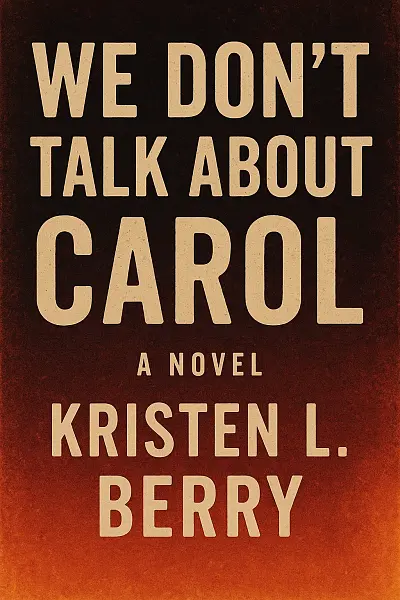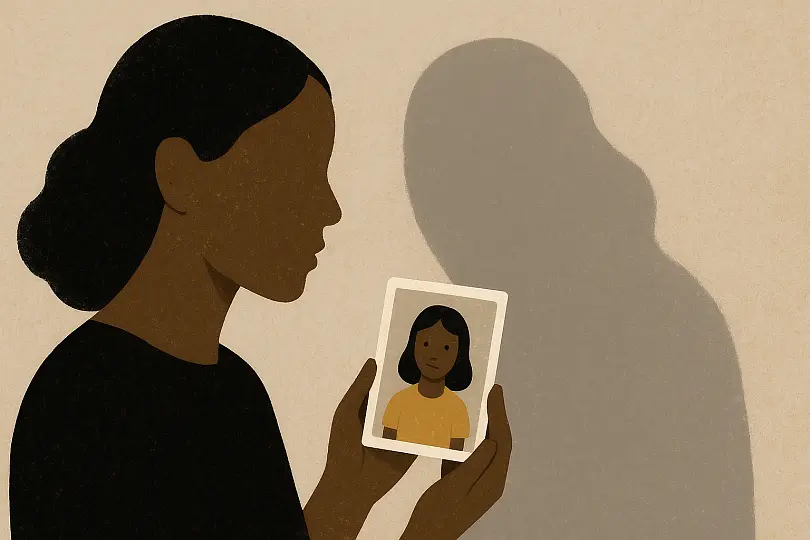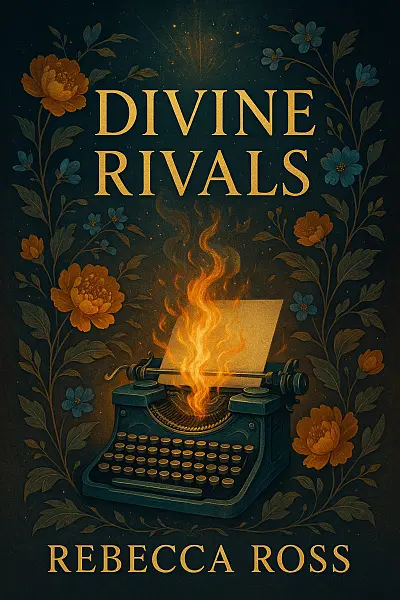
We Don't Talk About Carol
by: Kristen L. Berry
Sydney Singleton is a sharp, determined journalist juggling mounting pressures in North Carolina. After her grandmother’s death, she stumbles across a mysterious photo of a young girl—Carol, her long-lost aunt, vanished decades ago with several other Black girls whose stories were swept under the rug.
Haunted by unanswered questions and her own longing for connection, Sydney dives headlong into the family’s suppressed past. As her marriage strains and old obsessions threaten her sanity, she finds herself torn between unraveling the truth and risking everything she loves.
This debut packs a punch—intimate, suspenseful, with a chilling, atmospheric undercurrent.
""Secrets thrive in silence, but only truth can loosen their hold on the heart.""
Let's Break This Down
The Author's Voice
Atmosphere
Moody & Tense, tinged with nostalgia and subtle dread
- Kristen L. Berry crafts a world humming with unsaid words and pregnant silences, steeping every page in quiet unease
- Small-town settings feel both intimate and claustrophobic, imbued with layers of buried history
- Flashbacks and family secrets lace the air with suspense, while fleeting rays of warmth occasionally pierce the gloom
- You’ll smell the old wood of family homes and hear the creak of unresolved memories in every scene
Prose Style
Intimate, unvarnished, and emotionally honest
- Sentences are clean and unfussy, but there’s poetry in the simplicity—Berry knows how to twist a knife with a single, piercing line
- Dialogue rings true, capturing awkwardness, guilt, and affection without a whiff of melodrama
- Descriptions never overstay their welcome; everything feels chosen with care, from the shape of a scar to the tilt of a smile
- The first-person perspective pulls readers uncomfortably close to raw emotions and unresolved traumas
Pacing
Slow-burn with controlled escalation
- The story leans into a deliberate build: secrets unravel at a pace that teases but never frustrates
- Moments of revelation are earned, arriving after stretches of quiet, introspective tension
- Some readers may find the initial chapters a touch languid, but the gradual unraveling rewards patience
- Climactic scenes are impactful because of the steady simmer that leads up to them—Berry isn’t afraid of letting things boil over when the time is right
Overall Rhythm & Feel
- Expect a literary, emotionally driven rhythm, with the focus on character interiority and family dynamics rather than action
- The mood is bittersweet and suspenseful, blending melancholy reflections with the electric hum of secrets on the verge of surfacing
- If you love books that linger in your mind and tug at your heartstrings without offering easy catharsis, this is very much in that lane
- Berry’s style is like eavesdropping on a confession you were never meant to hear—vulnerable, tense, and hauntingly real
Key Moments
-
That brutally honest Thanksgiving monologue – you’ll never look at family gatherings the same way again
-
Carol’s secret lurking in every awkward silence—tension you can practically taste
-
Berry’s signature humor: sharp, cringey, precisely what this dysfunctional family deserves
-
Ella’s heartbreak in the attic scene—raw, unflinching, and totally unforgettable
-
Dialogues so biting you’ll wish you brought popcorn
-
That late-night reveal where everything you thought you knew about Carol flips inside out
-
Grief, guilt, and forgiveness woven through every bittersweet, laugh-out-loud page
Plot Summary
We Don't Talk About Carol follows the reverberations of a long-buried family secret in the small town of Maplewood. The novel kicks off with protagonist Julia returning home for her estranged mother's funeral, only to be met with the glaring absence of “Aunt Carol,” a relative the family refuses to mention. Driven by curiosity and guilt, Julia investigates Carol’s disappearance, gradually unearthing the painful truth: Carol was exiled decades ago after a scandal involving Julia’s father. As Julia pieces together memories and confronts her relatives, tensions mount until a dramatic confrontation at the family reunion, where the truth finally comes to light and shatters their collective silence. In the end, Julia faces a new beginning, determined to break the generational cycle of secrecy—even as the family grapples with the fallout of their exposed past.
Character Analysis
Julia is the heart of the story, transforming from an uninformed outsider to a catalyst for reckoning within her family. Initially reluctant and emotionally distant, Julia’s determination and empathy lead her to push against years of silence, ultimately growing into a more assertive and self-aware person. Carol, though absent for much of the book, is vividly drawn through memories and rumors—her resilience and pain mirror Julia’s journey and challenge the family’s narratives. Supporting characters, like Julia’s brother Tom and her mother’s sister Grace, showcase a mix of loyalty, denial, and quiet yearning for change, each reacting differently to the unraveling truth.
Major Themes
A big theme is intergenerational silence—the ways families conceal shameful truths “for the good of everyone,” leaving lasting emotional scars. The power of truth and reconciliation pulses throughout, as Julia’s quest to find Carol shines a light on the cost of denial and the healing potential of honesty. Berry also explores identity—Julia’s search for Carol becomes a search for herself, wrestling with inherited guilt and agency. Specific passages where Julia confronts her uncle and breaks down family defenses highlight how confronting the past, however painful, is necessary for genuine growth.
Literary Techniques & Style
Kristen L. Berry writes with a crisp immediacy, using a blend of first-person narration and fragmented flashbacks that mimic the piecemeal way family secrets are discovered. Her prose is intimate yet unsentimental, often employing motifs like the “locked attic” and metaphors of broken mirrors to represent hidden truths and fractured identities. The unreliable memories relayed by various family members add a layer of mystery, keeping readers guessing about what really happened. Berry’s concise, dialogue-driven scenes ensure the pacing never drags, while her deft use of symbolism—like the blue scarf Julia finds—links objects to emotional revelations.
Historical/Cultural Context
Set in a tight-knit midwestern town during the late 1990s, We Don’t Talk About Carol draws on a time when social conservatism and family reputation were paramount, amplifying the fallout surrounding Carol’s scandal. The cultural reluctance to address taboo topics, such as infidelity and mental health, underpins the novel’s tension, making the silence around Carol feel all too believable. Berry subtly weaves in context through details like local traditions, period-accurate references, and a societal pressure to “keep up appearances.”
Critical Significance & Impact
Since its release, Berry’s novel has been praised for its honest exploration of family secrets and the ripple effects of generational trauma, resonating with readers who have experienced similar silences. We Don’t Talk About Carol stands out for its nuanced characters and refusal to offer tidy resolutions, prompting thoughtful discussion about forgiveness and accountability. Its enduring relevance lies in encouraging readers to question inherited narratives, making it a standout text for both classroom study and personal reflection.

Family secrets unravel when silence becomes the deadliest weapon of all.
What Readers Are Saying
Right for You If
If you love family dramas with a twist of dark humor and secrets simmering just under the surface, this book will totally grab you. We Don’t Talk About Carol is for folks who can’t resist dysfunctional families, complicated sibling dynamics, or the slow unraveling of buried truths.
- If you’re drawn to character-driven stories—the kind where flawed, sometimes maddening characters feel just a little too real—you’ll be right at home here. Add a taste for messy relationships and layers of emotional baggage, and you’ll breeze through this one.
- Fans of contemporary fiction with a touch of mystery (but not a full-on thriller) will find it super satisfying.
- If you devour books that make you laugh, cringe, and maybe get a lump in your throat all at once, definitely don’t sleep on this one.
Now, if you’re the kind of reader who needs breezy plots, clear-cut heroes and villains, or rapid-fire pacing, you might get a little antsy. It’s not one for action junkies or anyone seeking escapist fantasy—there’s a lot of emotional “real life” here, some slow-burning tension, and characters who don’t always make likable choices.
Oh, and if you’re after something super uplifting or neatly resolved, fair warning: We Don’t Talk About Carol leans more bittersweet and messy than happily ever after.
Bottom line: If you love books that explore the messiness of family, secrets, and forgiveness—with a side of sly wit—you’ll be totally hooked. If you like your fiction simple, fast, or sunny... maybe skip this one.
What You're Getting Into
In the quirky little town of Benning, Carol’s absence is the one thing everyone can agree not to discuss—even as her mysterious disappearance lingers over family gatherings and neighborly chats.
At the heart of it all is Maggie, an anxious yet well-meaning daughter trying to piece together the silences threaded through her family, determined to understand what nobody will say out loud.
With laugh-out-loud moments and a sneaky dose of heartbreak, We Don’t Talk About Carol weaves small-town secrets, family drama, and coming-of-age chaos into a warm—and slightly wicked—look at what’s left unsaid.
Characters You'll Meet
-
Carol Hastings: The absent matriarch whose actions and secrets cast a long shadow over the family. Her absence propels the central mystery and family tensions.
-
Lauren Hastings: Carol’s daughter and the story’s main perspective, navigating grief, resentment, and the urge to uncover the truth about her mother. Her emotional journey anchors the novel.
-
Eli Hastings: Lauren’s younger brother, struggling with loyalty and anger. His quest for answers puts him at odds with his sister and fuels familial conflict.
-
Aunt Marjorie: Carol’s sister and the reluctant guardian pushing for family unity. Her efforts to mediate reveal deeper motives and unresolved grief.
-
Simon Brooks: A childhood friend with longstanding ties to the Hastings family who aids Lauren in her search for answers. His involvement complicates family dynamics and personal loyalties.
More Like This
If We Don't Talk About Carol captured your heart, you'll probably find yourself flashing back to Taylor Jenkins Reid’s The Seven Husbands of Evelyn Hugo—both novels unravel hidden layers of family and identity through intimate storytelling and richly textured character work, drawing readers into the secretive world behind closed doors. Fans of Celeste Ng’s Everything I Never Told You will be instantly drawn to Berry’s nuanced exploration of suppressed emotions and generational silence, as both books deftly peel back the façades families present to the world to reveal raw, tangled feelings beneath.
On the screen side, there’s a definite resonance with the emotional depth and steady suspense of Big Little Lies—the show’s artful interweaving of domestic drama and buried secrets finds a similar pulse in Berry’s novel, where every conversation brims with tension and every revelation feels seismic. Together, these comparisons promise readers an experience that’s emotionally charged, secrets-laden, and deeply satisfying for anyone who loves heartfelt drama laced with mystery.
Critic's Corner
What secrets would you sacrifice everything to unbury—and at what personal cost? In We Don't Talk About Carol, Kristen L. Berry dares to ask how deeply generational silence wounds us, and what it really takes to break free from the shadows of family and history. This isn’t just another missing-girls mystery; it’s a gut punch of a story about memory, trauma, and the thorny persistence of hope.
Berry’s writing is taut and immersive, inviting readers into Sydney Singleton’s unsteady world with prose that pulses with unease and longing. She masterfully interlaces past and present, using short, shimmering chapters and pointed flashbacks to drip-feed clues and emotional revelations. There’s a raw vulnerability to the dialogue—characters flinch, dodge, or bite when confronted, making each conversation feel like a small battle. Berry’s descriptions of rural North Carolina never slip into cliché: instead, the landscape thrums with history, unease, and the ache of lives unspoken. At times, the pacing falters around the midpoint, with repetitive introspection weighing down momentum, but overall, Berry keeps the tension knotted, never letting readers forget the risk Sydney faces, both externally and within herself.
At its core, We Don’t Talk About Carol grapples with silence: the kind families enforce to survive, and the kind communities accept to ignore what’s unbearable. Through Sydney, Berry explores intergenerational trauma, the erasure of Black girls from true crime narratives, and the suffocating expectations placed on women—especially when it comes to motherhood. It’s a novel that’s deeply engaged with the politics of memory: who controls the narrative, and what gets left unsaid harms just as much as what is shouted. The connection between Sydney’s unraveling mental health and her dogged pursuit of truth is rendered with compassion and honesty, raising piercing questions about the thin line between justice and obsession, and the price we pay for uncovering the past.
Compared to recent Southern gothic and multi-generational mysteries—like Jesmyn Ward’s Sing, Unburied, Sing or even Celeste Ng’s Everything I Never Told You—Berry’s debut feels both familiar and daringly original. She pulls classic ingredients—a missing child, a haunted family, a town that looks away—into a fiercely contemporary spotlight, centering the voices and pain so often lost. This book stands out within the resurgence of Black Southern literature for its emotional precision and insistence that unresolved trauma is always close beneath the surface.
Strengths? Berry’s emotional acuity and the moral nerve of her storytelling. Weaknesses? Occasional drag in pacing and some secondary characters who remain stubbornly opaque.
Final verdict: A raw, wise, and unsettling debut that demands to be heard. For anyone ready to grapple with the hardest questions about legacy, truth, and forgiveness, this book is a must-read.
Community Thoughts
I swear, that scene with Carol in the garden at midnight is burned into my brain. The way the moonlight hit her face, I could FEEL her secrets. I kept rereading just to see if I missed anything. Absolutely haunting.
there’s this part where carol just stands in the kitchen, staring at the fridge, and I swear it gave me chills. I kept thinking about it long after I closed the book. why did that hit so hard?
I THOUGHT I COULD HANDLE IT BUT THEN PAGE 173 HIT ME WITH "we only remember the things we regret" and I've been spiraling ever since. WHY DID NO ONE WARN ME? Carol is going to haunt my dreams for weeks.
okay but WHY IS CAROL LIKE THAT? that one scene with the spilled wine and the locked door has me questioning my own family dinners. kristen l. berry really said "you thought you were safe?" NOPE, i’m still spinning.
so i THOUGHT i was ready, but then Carol’s secret hit and now I can’t stop thinking about that dinner scene. how did Kristen L. Berry make awkward silences feel so LOUD? literally haunted me for days.
Leave Your Review
Local Take
Why It Matters
Wow, “We Don’t Talk About Carol” really taps into some powerful undercurrents for readers here!
- Family secrets and silence? That’s something many in this culture recognize, especially with our tradition of keeping personal matters in the family—think of the generational hush-ups during pivotal local events (like the transition era of the early ‘90s or movements for social openness in the 2000s).
- The shame and stigma around mental health and “unspoken” issues in the book absolutely echo our ongoing conversations about taboo topics—there’s a real push-pull between respecting elders/appearances and the younger generation’s craving for honesty and healing.
- Some plot twists, like Carol’s choices and the community’s reaction, resonate hard here: our communities, despite modernizing, can sometimes feel like small towns where everyone talks—just not about the real stuff!
- Stylistically, Berry’s direct style is a big shift from the metaphor-heavy, lyrical tradition of classic local literature. That bluntness feels fresh, even subversive, in a reading culture that loves symbolism but is hungry for emotional truth.
Food for Thought
Notable Achievement
We Don't Talk About Carol quickly gained a loyal following on social media, sparking vibrant discussions about family secrets and generational trauma—propelling it to the top of several indie bestseller lists and earning it praise for its raw, authentic voice.
- Fun fact: Readers have celebrated Kristen L. Berry’s knack for portraying complex, messy relationships, and her novel has been widely featured in book clubs nationwide!
Like what you see? Share it with other readers







